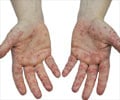Highlights
- A rapid increase in the outbreak of infectious syphilis among men who have sex with men has been seen recently.
- Most of these men are taking highly active antiretroviral therapy (HAART) for HIV infection.
- It is thought that HAART alters the immune responses to Treponema pallidum that causes syphilis, giving rise to syphilis epidemic.
Despite boosting the immune system, it is not clear why rates of syphilis among gay/bisexual men should be so much higher than those of chlamydia or gonorrhoea.
Sexually Transmitted Diseases
Syphilis is caused by the bacterium Treponema pallidum and characterized by genital sores. It is associated with significant complications if left untreated.
According to the Centers for Disease Control and Prevention (CDC), 2014 STD Surveillance Report, since 2006, cases of three nationally notifiable STDs – chlamydia, gonorrhea, and syphilis – have increased for the first time.
Rates of primary and secondary (P&S) syphilis has increased by 15.1% since 2013 and of gonorrhea by 5.1%.
Increasing rates of STD, mostly syphilis especially among gay men, contributed to the overall increases in 2014 across all three diseases.
In 2014, gay men accounted for 83% of reported cases of syphilis.
More than half of the gay men (51%) diagnosed with syphilis in 2014 were also HIV-positive.
Impact of HAART
The effectiveness of HAART may have led to the perception among the HIV infected and uninfected individuals that HIV transmission has become much less likely, and the effects of HIV infection less deadly.
This perception has increased sexual risk-taking, leading to other sexually transmitted diseases including gonorrhoea, chlamydia and syphilis.
But syphilis incidence has increased more rapidly than other STDs.
The impact of HAART on behavioral change and immune system change was reviewed to understand what might affect the prevalence of the infection.
Behavioral therapies mean that highly active antiretroviral therapy would result in more sexual partners and immune system changes mean that HAART would boost susceptibility to Treponema pallidum.
The likelihood of syphilis infection was assessed using to risk models:
- the lower risk model compared HAART with no treatment in an HIV positive partner
- the higher risk model compared existing infection with no infection in a partner who was either HIV negative or positive
The findings suggest that behavioral changes is insufficient to cause a sharp increase in the syphilis incidence and that an interplay between behavioral change and immune system changes would offer a possible explanation for a biological effect of HAART on the immune system.
HAART agents have the potential to alter the innate and acquired immune responses, that may enhance susceptibility to T. pallidum.
An increase in the number of an immune system cell called a T cell and a cascade of chemicals that stimulate an inflammatory response Is necessary for the removal of Treponema pallidum by the body. HAART dampens down these activities.
The clearance of chlamydia and gonorrhoea is less reliant on these processes.
Therapeutic and preventative HAART may be inadvertently increasing the incidence of syphilis.
Increased risk of certain types of cancer that have also been linked to HAART.
"Overall, these findings suggest a possible link between HAART and an increased risk for selected diseases of infectious and non-infectious origin, a potential unforeseen consequence that warrants further study," they write.
Limitations
In an accompanying editorial, Drs Susan Tuddenham, Maunank Shah, and Khalil Ghanem from Johns Hopkins University School of Medicine, Baltimore, caution that inadequate screening for chlamydia and gonorrhoea may explain the sudden rise in the syphilis cases.
They were previous outbreaks of syphilis in straight men and women in the 1980s and 1990s before the advent of HAART.
Factors which might influence infection risk like complexities of sexual relationships, such as relationship length or the number of concurrent partners, or decreased use of condoms in long term relationships, were not considered by researchers.
Researchers continue "We are living in an era where [antiretroviral therapy] is being used to effectively treat and prevent HIV infection. To some extent this seems to have tempered the urgency to control other [sexually transmitted infections]. As history has shown many times over, that would be a costly mistake."
They conclude "Over the past 15 years, syphilis rates among [men who have sex with men] have been rising unabated. We are not aware of any recent intervention that has led to a sustained decline in [these rates] in this population."
The findings are published in the journal Sexually Transmitted Infections.
Reference
- Reported Cases of STDs on the Rise in the U.S. - (https://www.cdc.gov/nchhstp/newsroom/2015/std-surveillance-report-press-release.html)
- Michael L Rekart et al. A double-edged sword: does highly active antiretroviral therapy contribute to syphilis incidence by impairing immunity to Treponema pallidum?. Sexually Transmitted Infections; (2017) doi:10.1136/sextrans-2016-052870
Source-Medindia












